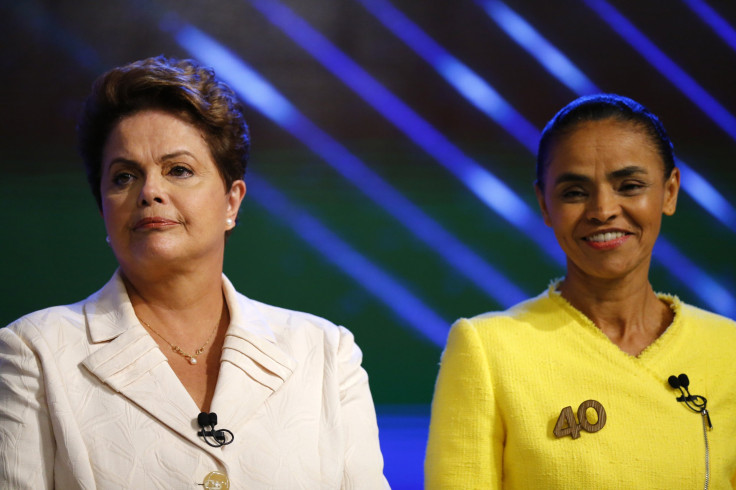Brazil Elections: Trade is Top Foreign Policy Issue Between Dilma Rousseff, Marina Silva

Brazilian President Dilma Rousseff and challengers Marina Silva and Aecio Neves have sparred over currency policy and social programs in the run-up to the presidential election Sunday. But one pressing topic has largely been left out of the debates: foreign policy.
“Foreign policy is not an issue for wide public debate,” said Peter Hakim of the Inter-American Dialogue, a Washington-based think tank. He indicated the average Brazilian voter is more concerned about the “kitchen table issues” such as access to consumer goods and the continuation of social programs that have lifted millions out of poverty.
However, business leaders have contended Brazil’s unwillingness to nurture its relationships with foreign partners has contributed to a stagnant economy that shrank for two consecutive quarters amid rising inflation and a weakening currency. The country’s two major trade partners -- China and Argentina -- are grappling with their own economic woes. Meanwhile, Brazil’s relationship with the U.S. has been strained after revelations the Obama administration spied on Rousseff’s personal communications. Financial experts have said more bilateral trade cooperation would open a growing Brazilian middle class to U.S. businesses, bolstering Brazil’s exports of crude oil and metals, as well as agricultural goods such as coffee and fruits.
If Rousseff retains her presidency, Brazil will likely continue its narrow foreign policy focused on strengthening relationships within South America. The Buenos Aires (Argentina) Herald reported Trade Minister Mauro Borges said last weekend that the Rousseff government was not looking to leave Mercosur, the trade bloc it shares with Argentina, Paraguay, Uruguay and Venezuela, a nod to Brazilian industrialists who benefit from the bloc.
Rousseff’s rivals, Silva and Neves, are currently neck and neck in polls to move into a runoff election with the incumbent. Both would rethink Brazil’s role in Mercosur. They have argued it stifles the Brazilian economy, which could appeal to voters hurting in an economy that has seen slow growth and high inflation since Rousseff took office.
Silva is also critical of Brazil’s relationship with Russia, India, China and South Africa through the BRICS economic partnership. She would rather see Brazil work with the Pacific Alliance, which consists of Chile, Colombia, Mexico and Peru. Meanwhile, Neves wants to focus less on Brazil’s often-controversial relationships with leftist governments in countries such as Venezuela and more on strengthening relationships with the U.S., Europe and China.
Under Rousseff, Brazil largely maintains a noninterventionist foreign policy. In her United Nations General Assembly speech in September, she sharply criticized violence in Iraq, Libya, Palestine, Syria and Ukraine.
“The use of force is unable to eliminate the deep causes of conflict,” she said before calling for a restructuring of the U.N. Security Council, as Bloomberg News reported. Brazil has been vying for a seat on the council since the U.N. was founded.
© Copyright IBTimes 2024. All rights reserved.












